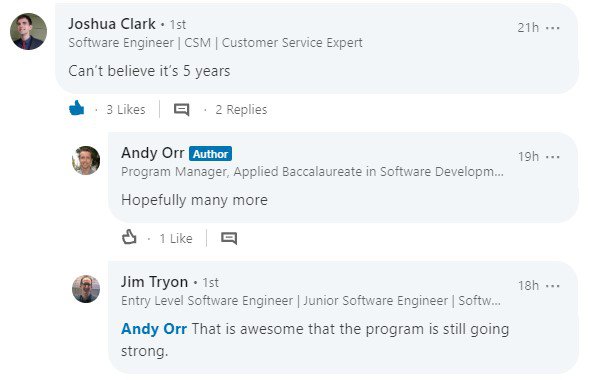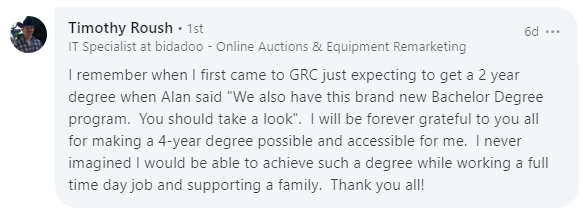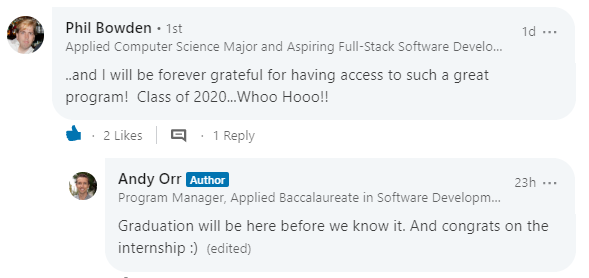Reconfiguring the Tech Talent Landscape
A 5-year retrospective on launching an applied baccalaureate in software development
Blog Post

Sept. 5, 2019
This piece is the first installment of New America's blog series on the community college baccalaureate. Stay tuned for more content highlighting the students, colleges, and communities where these programs are opening doors of opportunity.
Five years ago, in September 2014, Green River College launched an applied baccalaureate (AB) in Software Development. At the time, community colleges offering bachelor’s degrees was still a relatively new practice, both in Washington state and across the nation. These were the early days, and for our team a kind of terra incognita, like launching a startup. No playbook existed for doing work like this.
Fast forward to September 2019. To date, our AB in Software Development has graduated seven cohorts of students and awarded 132 degrees. 52 new students will enter the program in the 2019-20 school year, followed by another 52 students in 2020-21. Enrollments have grown steadily within a climate of historically low unemployment, when enrollments typically trend in the opposite direction. We’ve grown our instructional team from two to five full-time instructors to keep up with demand. Now one of the largest AB programs in Washington state, we’re writing our own playbook.

More than enrollment growth and degrees conferred, however, is the value AB degrees deliver to students and communities. As I often tell prospective students, an applied program like ours offers the best of both worlds, blending a wide breadth of general education courses and advanced technical training with the latest technologies to produce well-rounded, job-ready graduates. Small class sizes, stellar instruction from teachers with real industry experience, and project-based learning opportunities are also key benefits to the AB experience.
And of course, there’s affordable tuition. Students can earn a bachelor’s degree at a community college like Green River at up to half the cost of a state university. For those receiving need-based financial aid, awards stretch farther and can minimize, or in some cases eliminate, the need to take out a student loan.
So, here we are in 2019. Over these last five years, we’ve had the extreme privilege of changing lives and serving an amazing group of students. I think of Melissa, a single mom who went from laid-off casino dealer to program manager at Microsoft, and who was profiled recently in Washington Monthly. Stephen, who became a cloud systems administrator at Weyerhaeuser and is a strong advocate for our program within the company, where we now see students regularly place into internships each year. Elizabeth, a recipient of Green River’s prestigious President’s Award and a scholarship made possible by the National Science Foundation, now working as a software development engineer at Amazon Web Services. Sarah, a former cryptologic linguist with the United States Air Force and Joint Service Commendation Medal recipient, who became a technical program manager at Oracle. Brooks, who interned this past summer at REI and who is a recipient of the Washington State Opportunity Scholarship, a unique program that helps low- and middle-income students earn bachelor’s degrees in STEM fields.
There’s Tyler, Cynthia, and Mathias, who built a Punching Out Parkinson’s mobile application for coaches and researchers at Boxers with Parkinson’s. Jonn, Caleb, Timothy, and Nathan, who developed a prototype fan engagement application for the Seattle Thunderbirds. Kimberly, Joshua, Chris, and Joshua, who created a mobile-friendly website for the Kent Food Bank to help the organization promote services, accept volunteer sign-ups, and collect monetary donations. The list goes on; you can find more stories here.

Since launching in 2014, our applied baccalaureate has fast become a popular destination for career and technical students, returning alumni who earned an associate degree here at some point in the past, graduates from neighboring community colleges, first generation college students, veterans, international students, and career changers. Our students have diverse backgrounds and come from all walks of life.
Related, a recent demographic snapshot of our program shows students of color at 40%, students receiving financial need-based aid at 40%, and first generation students at 39%. The data would indicate the key role our applied baccalaureate plays in broadening access to an affordable four-year degree, while offering a compelling solution for regional tech wishing to diversify its workforce.

Outcomes like this aren’t limited to our program, either. Green River now offers eight four-year degree programs. Applied baccalaureate programs have picked up considerable steam across Washington state, too. Currently, a whopping 28 out of 34 community and technical colleges offer at least one four-year degree, with over 100 four-year degree options available system-wide. The goal? Implement degree programs that meet workforce needs in local communities and help Washington increase the overall number of baccalaureate degrees awarded to 42,400 per year. The time has passed for asking, “Should community colleges offer four-year degrees?” They do, and as far as I can tell, applied baccalaureates are here to stay.
As our program turns five, a round of “happy birthday” is in order. Our team is still learning. Our students continually teach us how to be better. Our alumni network grows by the month. Yes, applied baccalaureates take some explaining. There’s still a lot of work to be done telling their story and promoting their worth. But here in Seattle-Tacoma, we’ve seen firsthand how they change lives. Applied baccalaureates have the potential to reconfigure the tech talent landscape in a powerful way. I can’t wait to see what the future holds.

Enjoy what you read? Subscribe to our newsletter to receive updates on what’s new in Education Policy!